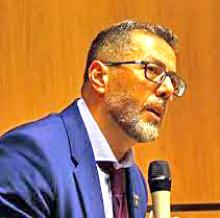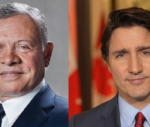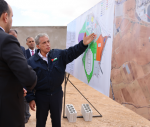You are here
The problem with Abbas and his PA
Jan 06,2015 - Last updated at Jan 06,2015
It was the moment many had been waiting for. On January 2, Palestine’s United Nations envoy Riyad Mansour formally requested membership in the International Criminal Court (ICC).
“We are seeking justice for all the victims that have been killed by Israel, the occupying power,” he said.
There was no explanation why Palestine’s membership in the Rome Statue (through which the ICC is governed) was delayed in the first place; why no justice was ever sought for thousands of victims in Gaza, and many in the West Bank and Jerusalem, although such membership would have been granted much earlier.
In fact, in 2012, Palestine’s status at the UN was upgraded from an observer entity to that of an “observer state”. The move was largely symbolic, but it had one single practical benefit: the coveted ICC membership.
Finally, a measure of justice was possible. Yet, for two years, the Palestinian Authority of Mahmoud Abbas delayed. Not only did Abbas hesitate and carried on with the same tired charade of peace process, he also seemed keen on ensuring that Palestinian unity, even if achieved politically, remained pointless and ineffective.
But isn’t it better late than never?
Agence France-Press described Abbas’ move as a “shift in strategy… away from the US-led negotiation process”.
The US seemed peeved by the move, describing it as “counterproductive”.
Yet this is not exactly about the killing of nearly 2,200 Palestinians, mostly civilians, during the 51-day Israeli war on Gaza last summer. Or even the siege on the strip, the occupation and illegal settlements in the West Bank and Jerusalem.
Certainly Abbas had numerous chances to admonish Israel in the past, cement unity among his people, use his leverage with Egypt to at least ease the siege on Gaza, devise a strategy that is centred around national liberation, end the ongoing theft of Palestinian resources by the PA itself, and so on.
Instead, he kept his faith in Washington, playing the wait-and-see game of Secretary of State John Kerry, centred on a single premise: pleading with Netanyahu to change his ways and freeze settlement construction, which never happened.
Analysis suggests that Abbas’ ICC move was the direct outcome of the expected failure of a UN Security Council resolution that was put to vote a few days earlier.
The US, Israel’s main political guardian, was, naturally, expected to veto the resolution, which would have imposed a deadline on Israel to end its occupation of Palestinian territories.
The US used the veto and only eight member states voted in approval. A day later, Abbas signed the application for the ICC, among others; the following day, the application was formally submitted.
But a shift in strategy it was not.
The current political strategy of the PA reflects Abbas’ qualities and is testimony to his impressive abilities to find the right political balance, ultimately aimed at assuring his survival at the helm.
If Abbas’ own political subsistence largely depends on Israel’s acquiescence and US backing, one can rarely imagine a scenario in which Prime Minister Benjamin Netanyahu and his war generals are arraigned as war criminals before the ICC.
It is unconceivable that Abbas finally decided to break away from the restrictive role of being an active member of the US-managed club of Arab “moderates”.
To do so, it would mean that Abbas is ready to risk it all for the sake of his people, which would be a major departure from everything he ever stood for.
So what is Abbas up to exactly?
Since the late 1970s, Abbas began his quest for an elusive peace with Israel, which ultimately led to the signing of the Oslo accords in September 1993. It was Abbas who signed the accords on behalf of the PLO.
The accords wrought disaster on Palestinians and failed to meet a single deadline, including the final status agreement, which was meant to actualise in May 1999; it introduced a bizarre culture of revolutionaries-turned-millionaires, operating within the confines of militarily occupied Palestinian territories.
Year after year, the corrupt PA maintained its privileges as Israel strengthened its occupation.
It was a massive barter that seemed to suit the interests of Israel, selected Palestinians and, of course, the US itself, which, along with its allies, funded the whole scheme.
Despite his “flexibility”, Yasser Arafat still had political boundaries that he would not cross. Thus, in 2003, Abbas the “moderate” was imposed on Arafat by both Israel and the US as a prime minister, a post that was invented with the sole purpose of containing Arafat’s control.
Following a brief power struggle, Abbas resigned. Shortly afterwards, Arafat died from possible poisoning, and Abbas returned to power, this time unchallenged.
Abbas’ mandate, starting January 15, 2004, should have ended in early 2009. But he decided to extend it by another year, and another, and has since then ruled over the fragmented, occupied nation, with the help of Israel, without a shred of legitimacy, except what he, and his supporters bestow on him.
It has been almost exactly a decade since Abbas ruled over Palestinians. They were years of tragedy, political failure, economic crisis, disunity and unprecedented corruption.
Yes, the 80-year-old leader has survived, partly because Israel found him the most compromising of all potential Palestinian leaders (he would not end security coordination with Israel even after he described the war on Gaza as genocidal).
The Americans, too, wanted him to remain in his post, for an alternative leader is yet to be found.
But he also survived because he used billions of dollars funnelled by international donors to construct a welfare system, creating a class of nouveaux riches Palestinians whose wealth was a result of the occupation, not despite it.
While the new rich basked in their undeserved wealth, the fate of millions of Palestinians was tied to pay cheques that were not the outcome of a productive economy but of international handouts.
At best, Abbas was a political manger whose strategy is predicated on finding political balances and catering to those with greater power and influence.
Following the expiration of Kerry’s deadline of April 29, 2014, aimed at reaching a final status agreement, and another major Israeli war on Gaza that ignited massive anger in the West Bank, Abbas’ burden was too heavy to bear.
To create distraction, and to deny the Gaza resistance any claim on victory, he began to hunt for his own “victory”, which he would then promote in Ramallah amid major fanfare and celebration of his supporters.
And after much delay and haggle, Abbas was forced by sheer circumstance to resort to the ICC, not to criminalise Israel, but to win political leverage and to send a message to Israel, the US and others that he still matters.
The move to join the ICC has little to do with the war crimes in Gaza and much to do with Abbas’ growing unimportance among his allies, but also his people.
The problem with Abbas, however, is bigger than Abbas himself. The ailment lies in the very political culture and class that sustained and benefited from political corruption for over 20 years.
Even when Abbas is shoved aside, due to old age or whatever else, the malaise will persist until the Palestinians challenge the very culture that Abbas has painstakingly constructed with US money and an Israeli nod.
The writer, www.ramzybaroud.net, is an internationally syndicated columnist, a media consultant, an author of several books, and the founder of PalestineChronicle.com. His latest book is “My Father Was a Freedom Fighter: Gaza’s Untold Story” (Pluto Press, London). He contributed this article to The Jordan Times.













